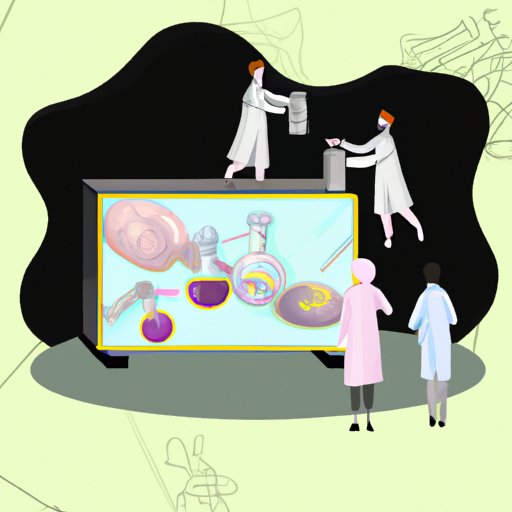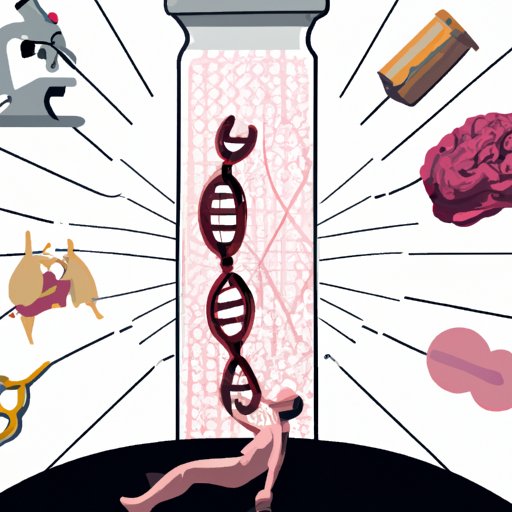Introduction
Donating your body to science is an incredibly generous act that has the potential to benefit countless individuals. Many people are unaware of the potential benefits and financial implications of donating their body to science, so it is important to understand all aspects of this decision before making the commitment.

Exploring the Benefits of Donating Your Body to Science
When considering whether or not to donate your body to science, it is important to understand the potential benefits that come along with the decision. Donating your body to science can make a lasting impact on medical advancements, as well as educational opportunities.
Medical Advancements
Donating your body to science can have a powerful impact on medical research and advancements. According to Dr. Stephen Kishner, a professor of medicine at Louisiana State University Health Science Center, “The use of cadavers in medical education and research has been vital for centuries. Without cadaver specimens, many of the advances in medicine would not have been possible.” By donating your body to science, you can help researchers gain a better understanding of how the human body works and develop treatments for various diseases and conditions.
Educational Opportunities
In addition to medical research, donated bodies are also used for educational purposes. Medical students rely on donated bodies for practical experience and to gain a better understanding of anatomy and physiology. According to the Whole Body Donation Program at Mayo Clinic, “Donated bodies help provide students with a deeper understanding of complex surgical procedures.” By donating your body to science, you can help the next generation of medical professionals gain the knowledge and skills they need to be successful.

The Financial Implications of Donating Your Body to Science
It is important to understand the financial implications of donating your body to science before making a decision. There are a few potential costs associated with body donation, including transportation and preparation fees. In some cases, body donation may even result in a potential tax savings.
Cost of Transportation and Preparation
One of the main costs associated with body donation is the cost of transportation and preparation. Depending on where the body is being donated, there may be a fee for transporting the body from the place of death to the facility where the donation will take place. Once the body arrives at the facility, there may also be a fee for preparing the body for donation.
Potential Tax Savings
In some cases, body donation may result in a potential tax savings. According to the Internal Revenue Service, “If you donate your body to a qualified organization, any costs associated with the donation, such as transportation and preparation fees, may be deductible.” It is important to note that these deductions must meet certain criteria in order to qualify, so it is best to consult with a tax professional before claiming any deductions.
Understanding the Process for Donating Your Body to Science
Once you have decided to donate your body to science, it is important to understand the process that will take place both before and after death. There are several pre-death considerations that should be taken into account, as well as post-death procedures that will need to be followed.
Pre-Death Considerations
Before deciding to donate your body to science, it is important to consider how your family and friends will feel about the decision. You should also discuss the process with them, as well as any potential costs associated with the donation. In some cases, it may also be necessary to fill out paperwork in advance in order to make the process easier for your loved ones.
Post-Death Procedures
Once you have passed away, there are several steps that must be taken in order to complete the donation process. The first step is to contact the facility where the body will be donated. They will provide instructions on what needs to be done in order to have the body transported and prepared. In most cases, the facility will cover the cost of transportation and preparation, but it is important to confirm this before making any arrangements.
A Look at the Ethical Considerations of Donating Your Body to Science
In addition to the financial implications, there are also ethical considerations that should be taken into account when deciding whether or not to donate your body to science. Respect for the body and privacy concerns are two of the most important ethical considerations.
Respect for the Body
When donating your body to science, it is important to respect the body and ensure that it is treated with dignity. According to the American Association of Tissue Banks, “The highest standards of respect for the donor, their family, and the gift of donation must be observed throughout the donation process.” It is important to choose a facility that has a reputation for treating donated bodies with respect.
Privacy Concerns
Another important ethical consideration is the issue of privacy. Donating your body to science means that your body will be used for research and educational purposes, which may involve the sharing of information with third parties. It is important to ensure that the facility has a clear policy regarding the protection of donor information before making the decision to donate.

Examining the Legal Requirements for Donating Your Body to Science
In addition to the ethical considerations, there are also legal requirements that must be taken into account when donating your body to science. Each state has its own regulations regarding body donations, so it is important to familiarize yourself with the laws in your state before making a decision.
State Regulations
Each state has its own regulations regarding body donations, so it is important to familiarize yourself with the laws in your state before making a decision. For example, in California, the Human Remains Disposition Law requires that all body donations must be made through a registered anatomical donation program. It is important to make sure that the facility you choose is properly registered in your state.
Requirements for Written Documentation
In addition to state regulations, there may also be other requirements for written documentation. For example, in some states, a donor must fill out an anatomical gift form in order for the donation to be valid. This form must be signed by the donor and two witnesses in order to be valid. It is important to familiarize yourself with the legal requirements in your state before making a decision.
Assessing the Cost of Donating Your Body to Science
When evaluating the cost of donating your body to science, it is important to compare the costs to other options. Depending on the location of the facility and the cost of transportation and preparation, the cost of body donation may be comparable to other funeral and burial options.
Possible Costs Associated with Donating
The cost of donating your body to science varies depending on the location of the facility and the cost of transportation and preparation. In some cases, the cost of body donation may be comparable to other funeral and burial options. However, it is important to understand that in some cases, there may be additional costs associated with body donation.
Cost Comparisons to Other Options
When comparing the cost of body donation to other options, it is important to factor in all of the potential costs, including transportation and preparation fees. In some cases, body donation may be the most cost-effective option, while in others, traditional burial or cremation may be more affordable. It is important to compare all of the costs before making a decision.
Conclusion
Donating your body to science is a generous act that has the potential to benefit countless individuals. Understanding the benefits and costs associated with body donation is essential for making an informed decision. Donating your body to science can have a powerful impact on medical advancements and educational opportunities, and in some cases, may even result in a potential tax savings. However, it is important to understand the legal requirements and ethical considerations before making a decision, as well as the possible costs associated with transportation and preparation.
Summary of the Benefits and Costs of Donating Your Body to Science
Donating your body to science can have a powerful impact on medical advancements and educational opportunities, and in some cases, may even result in a potential tax savings. However, it is important to understand the legal requirements and ethical considerations before making a decision, as well as the possible costs associated with transportation and preparation.
Final Thoughts
Donating your body to science is a generous act that can have a lasting impact on medical research and educational opportunities. While there are several potential costs associated with body donation, it is important to remember the potential benefits as well. Ultimately, the decision to donate your body to science is a personal one that should be made with careful consideration.
(Note: Is this article not meeting your expectations? Do you have knowledge or insights to share? Unlock new opportunities and expand your reach by joining our authors team. Click Registration to join us and share your expertise with our readers.)
